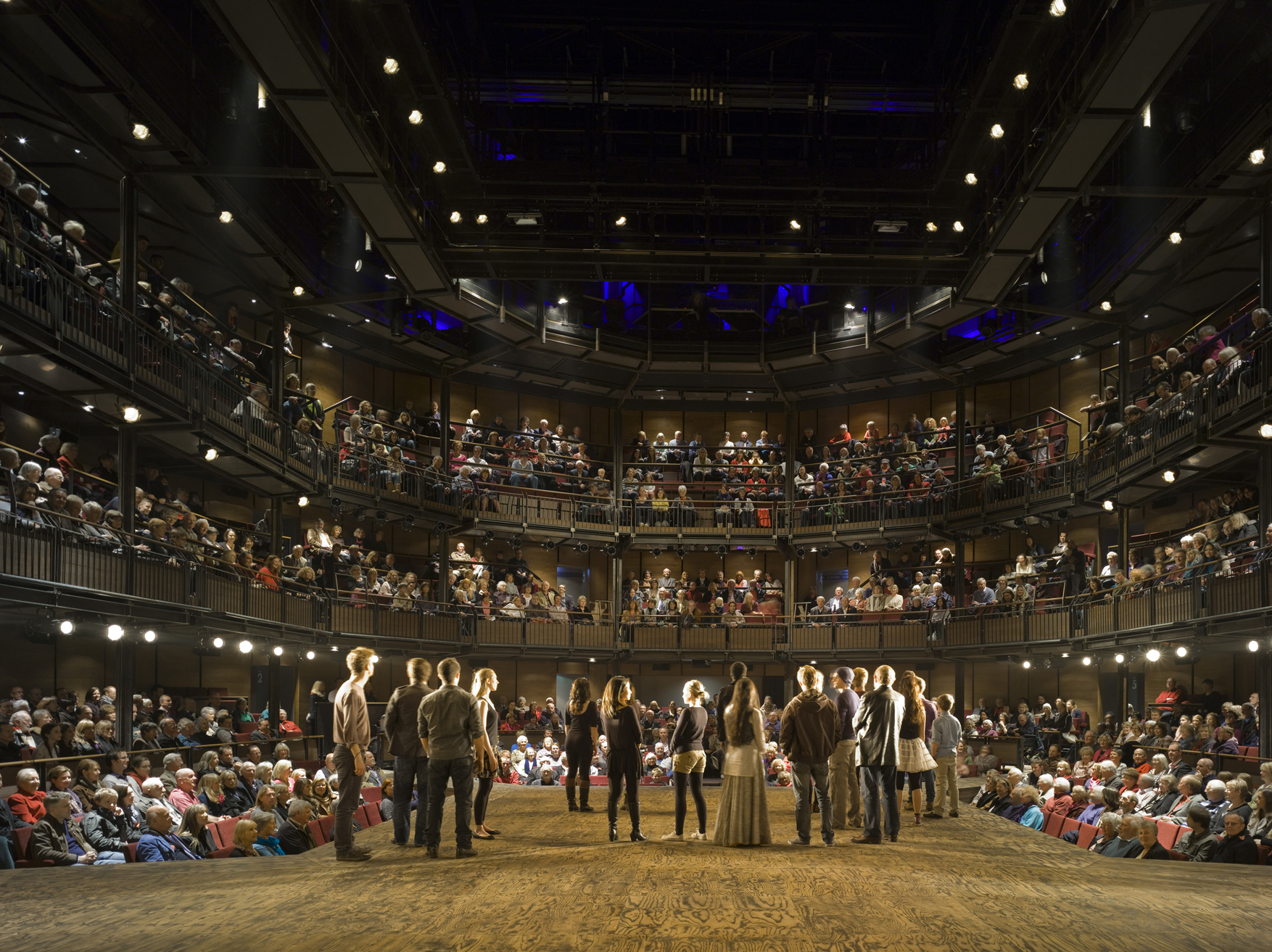Why the RSC is killing theatre – Rosy Trewin-Marshall
Following the 400th anniversary of the Bard’s death, Rosy Trewin-Marshall takes a controversial look at how Shakespeare is delivered in British theatre today.
It is a common assumption that theatre is a kind of self-important, secret society. A pretentious clique of, and for, the elite. Open that synonym dictionary and look up “pretentious”. Pretty much every word that comes after it is one that has, at some time or another, been directed (pardon the pun) at the theatre experience and the Royal Shakespeare theatre experience in particular: vainglorious, ostentatious, arrogant, haughty, toffee-nosed, affected. Sadly, at the very end of the list comes “theatrical”! And how has it come to this?
Cost is one place to start. At the RSC a ticket can be anything from £20 – £60. Even for students, in groups of 10, it’s still a whopping £18 a pop. Little wonder there is resentment and a public perception of hugely inflated prices for what you get. However much local and regional theatres, attempt to overcome this by lowering ticket prices and offering deals and concessions, it is still the case that it can cost five times more to see a West-End musical than to go to the cinema. The RSC make efforts to redress the balance. Get to the box office really quickly and you could get one of 20 tickets reserved for 18-25 year olds at just £5. Big deal. Down at the cinema you know just where you are. It’s £12. And you know exactly what you’re getting. Same quality every time.
And then there’s the eternal public whingeing over Arts council grants cuts. Why should the public sympathise when they can’t afford to get through the hallowed portals anyway?
The RSC got £15.7 million from the Arts Council in 2013/14. Incredibly that was only 26% of their running costs – which were £61.3million. They then had to bear a 7% cut. Imagine how that must have hurt. Poor dears! Fortunately they had already almost finished their £112 million refurbishment at Stratford. How lucky! Still it didn’t stop the lucky “luvvies” arguing over whether or not they should have built a “Thrust stage”. Their original artistic director , Sir Peter Hall, says not. He likens it to “a diving board” which force directors to keep the actors moving simply in order to deal with the sightlines – “not because of what the characters are feeling but because of what the lady in row A is feeling about not seeing them”. Meanwhile the present Artistic Director , Michael Boyd, ignores the criticism. The general public will be glad to hear it….or maybe not. “I love the marriage of the dance of human behaviour and the words.,” says Boyd. “Peter enjoys better the words. It is not entirely a generational thing, but two things have happened in theatre since 1961: Pan’s People and Pina Bausch” – referring to the late German avant-garde choreographer. Is it any wonder that the general public begin to see ALL theatre as pretentious and irrelevant…and costly?
While such arguments are going on in the plush auditorium at Stratford, just 100 miles away in Frome, Somerset, the 240 seater Merlin Theatre is not losing 7% of its funding. It’s losing the whole lot. And how much is that? A measly £35,500. And that wipes out its Arts Council funding altogether. It’s verging on closure. Along the road in Taunton, the esteemed Brewhouse Theatre went bust 2 years ago after the Arts Council took away its funding. In Northern Ireland the “Music Theatre 4 Youth” has lost its grant. The government should be subsidising theatres- a feature of society which stems back 2500 years to Ancient Greek society where the introduction of public fees enabled the poor to attend theatre of religious and social consequence- but equally, theatres must lower their cost and their expectations or it is little wonder the public see the RSC and , by a sadly mistaken extension, the whole of theatre , as an inflated, self-opinionated, irrelevance.
Perhaps there should be a greater concentration on the cheaper, grassroots community companies that can draw the public in to live shows and introduce them to an experience they couldn’t get in any other way. Instead, with incomprehensible, off-putting debates over style and stars and the shape of your stage and the internecine wrangling over the cost of a ticket, the public are left asking “why would you spend that extra money?”
With the huge number of movie making ministries targeting almost all audiences, there is bound to be a movie made just for you. What’s more, cinema offers added value like the use of CGI (computer generated imagery) in films. This adds new, mind-boggling dimensions, an experience which, simply cannot be replicated on stage.
One cannot over-state the fundamental difference for an audience experiencing the magic of live performance. It is difficult to believe that you could feel an emotional connection with characters in theatre when you are not inches away from a screen showing BCUs (big close ups), but so far away, in fact, that the stage appears to be the size of a mobile phone, and you are so high up in the gods that you are more focused on not being sick than on contemplating the complexities of Twelfth Night unravelling beneath you. In many of the more modern peices of theatre, the stage is of little consequence as the barriers between audience and actors are broken down so large and distant spaces for seats would be impractical. It tends to be work like this which speaks volumes about our society and therefore is of consequence to those who watch it, whilst also being on a much lower-budget as in real life, we do not have £15.7million to spend. Theatre companies, like Forced Entertainment, or Rash Dash are what theatre is really about.
Perhaps theatres generally, but the leading lights in particular, should go back to basics and try to see it as the masses probably do. It’s ironic that Shakespeare himself knew so well how to entertain the masses and wasn’t ashamed to pull them in and write what he knew they’d love to see. Go Globe!

Of course, if this is how much of the public feels, the real damage will happen when the wannabe actors don’t “want to be” anymore and that the answer to that famous question in Hamlet, is simply, ‘not to be’. When they feel they can’t break into a posh theatrical world and are put off the idea as a career path. The modern day demand for a University degree results in the students not daring to head for “drop-out drama school”. Only the utterly committed – perhaps from an acting dynasty – and with money behind them, will be daring enough to push into the profession. The emphasis by professional companies, such as the RSC, on the technical and academic perspective, ignores the emotional truth that many of Britain’s young actors want to create, experiment and act – with or without pretentious rule books.
But why should this be when it is clear that kids in school are veering ever further away from the core subjects and ever nearer to the creative? For thousands of student all over the country, drama lessons are their favourite, the lesson which is less about regurgitation and more about expressing yourself. Even where this is concerned however the known generalisation of what theatre is, defined by those orthodox theatre companies, is that regurgitation, is still a necessary in drama. How would you learn your lines without it? Devised theatre. That’s how! But this form is looked down upon by almost all the national theatres
Visit the annual Edinburgh Fringe Festival, and you can see that the shows selling out are not Chekov’s ‘Three Sisters’ or selected Shakespeare works or thought provoking French existential efforts but the late night showings of experimental pieces and rebellious, unorthodox performances such as ‘S**t-faced Shakespeare’ where the actors attempt to keep the story of William Shakespeare’s famous play ‘Much ado about nothing’ whilst a raucous audience control how much alcohol the actors consume with shouts and screams of “More Ale”.
Perhaps the lesson is a little less pomposity and a little more humanity, but most of all a little more understanding of what damage you can do when you build a multi-million pound commercial theatre business which dwarfs all rivals, however small, and which is named after one of the most populist and popular playwrights ever.













1 comment